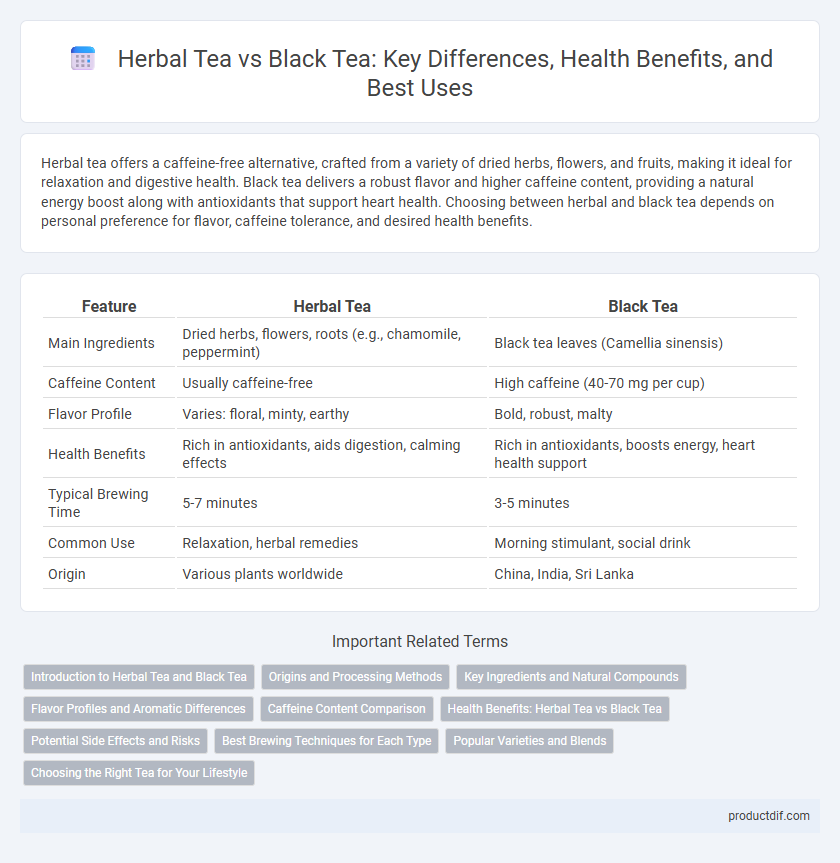Herbal tea offers a caffeine-free alternative, crafted from a variety of dried herbs, flowers, and fruits, making it ideal for relaxation and digestive health. Black tea delivers a robust flavor and higher caffeine content, providing a natural energy boost along with antioxidants that support heart health. Choosing between herbal and black tea depends on personal preference for flavor, caffeine tolerance, and desired health benefits.
Table of Comparison
| Feature | Herbal Tea | Black Tea |
|---|---|---|
| Main Ingredients | Dried herbs, flowers, roots (e.g., chamomile, peppermint) | Black tea leaves (Camellia sinensis) |
| Caffeine Content | Usually caffeine-free | High caffeine (40-70 mg per cup) |
| Flavor Profile | Varies: floral, minty, earthy | Bold, robust, malty |
| Health Benefits | Rich in antioxidants, aids digestion, calming effects | Rich in antioxidants, boosts energy, heart health support |
| Typical Brewing Time | 5-7 minutes | 3-5 minutes |
| Common Use | Relaxation, herbal remedies | Morning stimulant, social drink |
| Origin | Various plants worldwide | China, India, Sri Lanka |
Introduction to Herbal Tea and Black Tea
Herbal tea, made from a diverse range of dried flowers, fruits, herbs, and spices, offers caffeine-free options rich in antioxidants and natural health benefits. Black tea, derived from the Camellia sinensis plant, undergoes full oxidation, resulting in a bold flavor profile and a moderate caffeine content that supports alertness. Both beverages cater to different taste preferences and health goals, making them popular choices worldwide.
Origins and Processing Methods
Herbal tea originates from a variety of dried flowers, herbs, and fruits, with no tea leaves involved, offering caffeine-free options derived from plants like chamomile, peppermint, or hibiscus. Black tea is made from the fully oxidized leaves of the Camellia sinensis plant, typically grown in regions such as Assam, Darjeeling, and Ceylon. Processing methods for black tea involve withering, rolling, oxidation, and drying, while herbal teas undergo drying or infusion without oxidation.
Key Ingredients and Natural Compounds
Herbal tea is made from a variety of dried herbs, flowers, and spices, often containing antioxidants, flavonoids, and essential oils that support digestion and relaxation. Black tea, derived from Camellia sinensis leaves, is rich in caffeine, theaflavins, and thearubigins, which contribute to its bold flavor and potential cardiovascular benefits. Both teas offer unique natural compounds with distinct health properties, making them suitable for different wellness needs.
Flavor Profiles and Aromatic Differences
Herbal tea offers a diverse range of flavor profiles, often characterized by floral, fruity, and earthy notes, without the bitterness commonly found in black tea. Black tea contains robust, malty, and sometimes smoky flavors, accompanied by a strong aroma derived from oxidized tea leaves. The aromatic differences highlight herbal teas' natural fragrance variety, while black tea provides a more consistent, intense scent due to its fermentation process.
Caffeine Content Comparison
Herbal tea contains little to no caffeine, making it an ideal choice for those seeking a caffeine-free beverage, while black tea typically contains 40-70 milligrams of caffeine per 8-ounce cup. The caffeine content in black tea varies depending on the brewing time and tea leaf quality, often providing a moderate stimulant effect. Consumers aiming to reduce caffeine intake can favor herbal blends such as chamomile, peppermint, or rooibos, which naturally lack caffeine.
Health Benefits: Herbal Tea vs Black Tea
Herbal tea is rich in antioxidants, anti-inflammatory compounds, and naturally caffeine-free, promoting relaxation, improved digestion, and immune support. Black tea contains high levels of flavonoids that enhance heart health, reduce blood pressure, and boost mental alertness due to its moderate caffeine content. Both teas offer distinct health benefits, with herbal tea favored for calming effects and black tea valued for cardiovascular and cognitive advantages.
Potential Side Effects and Risks
Herbal tea, derived from various plants and herbs, may cause allergic reactions or interact with medications, posing risks for individuals with allergies or certain health conditions. Black tea contains caffeine, which can lead to insomnia, increased heart rate, or anxiety when consumed in excess, especially in sensitive individuals. Both beverages require moderation to avoid adverse effects such as digestive disturbances or impaired nutrient absorption.
Best Brewing Techniques for Each Type
Herbal tea requires steeping in water heated to about 200degF (93degC) for 5 to 7 minutes to extract the delicate flavors without bitterness. Black tea demands boiling water at 212degF (100degC) and a shorter brewing time of 3 to 5 minutes to preserve its robust, full-bodied taste. Using the correct water temperature and steeping duration enhances the unique aroma and health benefits inherent in each type of tea.
Popular Varieties and Blends
Herbal tea varieties include chamomile, peppermint, and hibiscus, prized for their caffeine-free properties and unique health benefits. Black tea popular blends consist of Assam, Darjeeling, and Earl Grey, known for their robust flavor and higher caffeine content. Both categories offer diverse options catering to different taste preferences and wellness needs.
Choosing the Right Tea for Your Lifestyle
Herbal tea offers a caffeine-free option rich in antioxidants, ideal for relaxation and evening consumption, while black tea provides a robust flavor with higher caffeine content, supporting increased alertness and mental focus during busy days. Selecting the right tea depends on your daily routine and health goals, such as choosing herbal infusions like chamomile or peppermint for stress relief and digestion, or black teas like Assam or Darjeeling for sustained energy and antioxidant benefits. Understanding these differences helps tailor your beverage choice to enhance well-being and complement your lifestyle effectively.
Herbal Tea vs Black Tea Infographic

 productdif.com
productdif.com